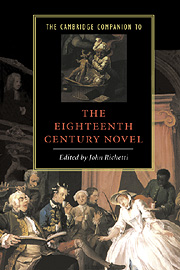Book contents
- Frontmatter
- 1 Introduction
- 2 The novel and social/cultural history
- 3 Defoe as an innovator of fictional form
- 4 Gulliver's Travels and the contracts of fiction
- 5 Samuel Richardson
- 6 Henry Fielding
- 7 Sterne and irregular oratory
- 8 Smollett's Humphry Clinker
- 9 Marginality in Frances Burney's novels
- 10 Women writers and the eighteenth-century novel
- 11 Sentimental novels
- 12 Enlightenment, popular culture, and Gothic fiction
- Index
9 - Marginality in Frances Burney's novels
Published online by Cambridge University Press: 28 May 2006
- Frontmatter
- 1 Introduction
- 2 The novel and social/cultural history
- 3 Defoe as an innovator of fictional form
- 4 Gulliver's Travels and the contracts of fiction
- 5 Samuel Richardson
- 6 Henry Fielding
- 7 Sterne and irregular oratory
- 8 Smollett's Humphry Clinker
- 9 Marginality in Frances Burney's novels
- 10 Women writers and the eighteenth-century novel
- 11 Sentimental novels
- 12 Enlightenment, popular culture, and Gothic fiction
- Index
Summary
The heroines of Frances Burney's four novels embody a set of contradictions so paradigmatic of the later eighteenth century that they might be said to define the ideological tensions inhering in the period's complex demarcations of woman's social place. Burney's heroines are proper, decorous, and innocent, yet preternaturally aware of social danger; diffident yet fiercely self-protective; publicly self-effacing yet bent on independence of thought and action; ambiguously presented as to class yet adhering to upper-class ambitions; apparently unknowing about social mores and expectations, yet acutely observant of others and conscious of their own desires. Many recent feminist critics have analyzed these contradictions in Burney's fiction and in her life.' The conflicts Burney's protagonists face energize the novel of courtship in the later eighteenth century. Burney insists that the period in which a young woman becomes quintessentially identified as marriageable - as single in several senses - forms a crucially liminal proving ground, a period during which fundamental social barriers are traversed.
- Type
- Chapter
- Information
- The Cambridge Companion to the Eighteenth-Century Novel , pp. 198 - 211Publisher: Cambridge University PressPrint publication year: 1996
- 1
- Cited by

